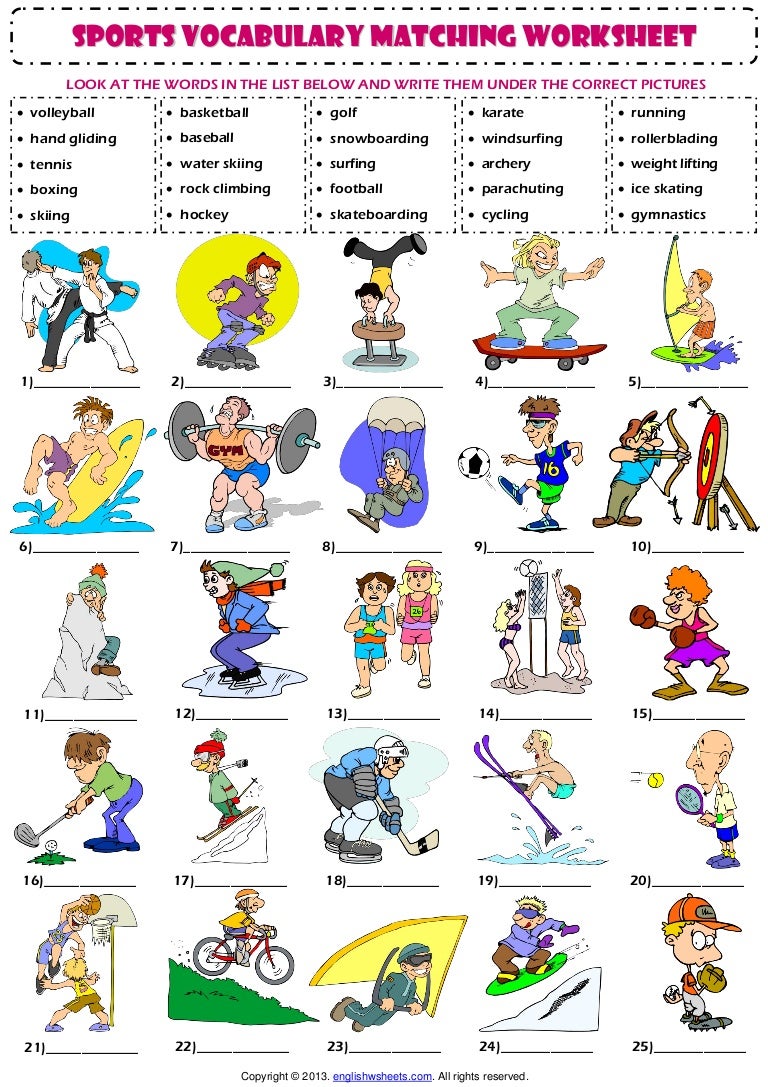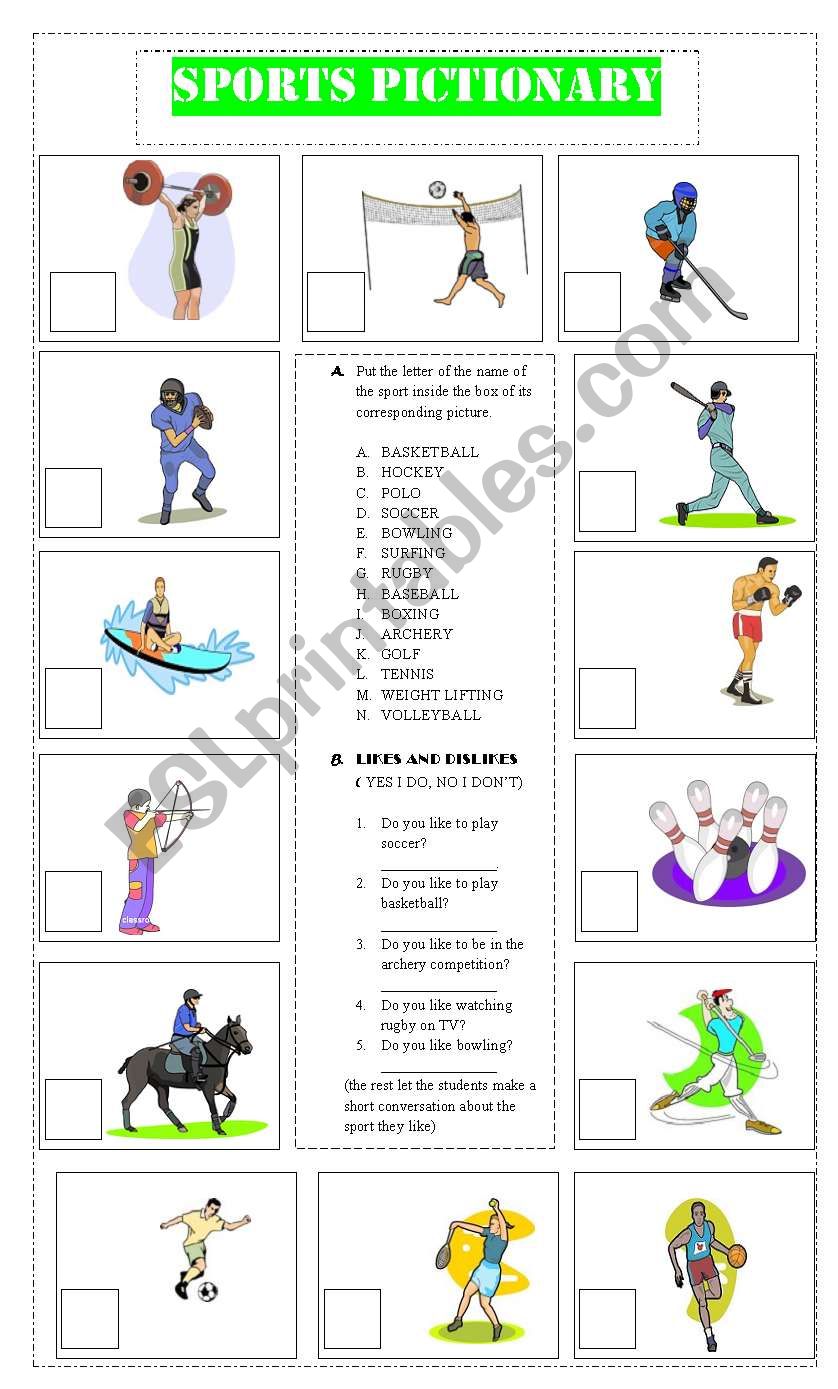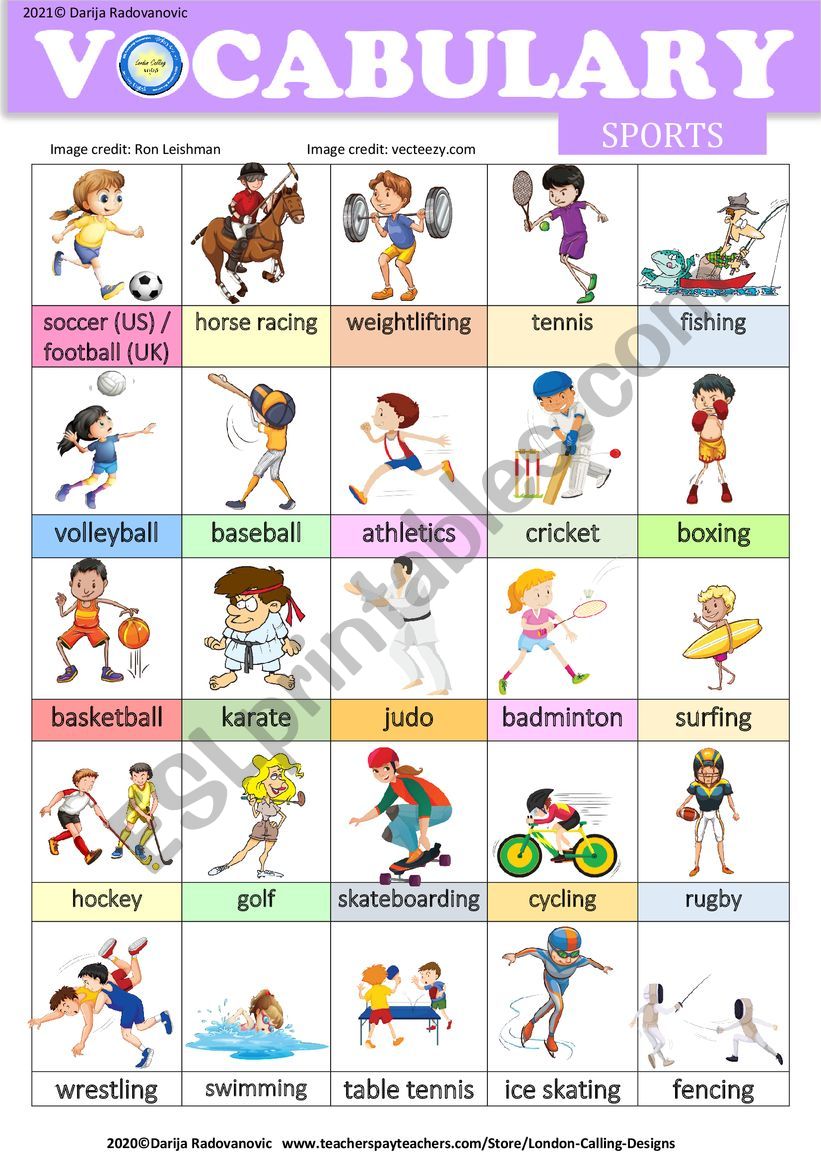Mastering the Game’s Lexicon: A Deep Dive into Sports Vocabulary Worksheets
Sports, in their myriad forms, are a universal language. From the roar of the crowd in a football stadium to the serene focus of a chess match, they transcend cultural boundaries and unite people across the globe. However, beneath the surface of the physical action lies a rich and specific vocabulary that is crucial for true understanding, discussion, and participation. For language learners, educators, and even native speakers looking to deepen their expertise, mastering this lexicon is essential. This is where sports vocabulary worksheets emerge as an invaluable pedagogical tool, offering structured, engaging, and effective pathways to linguistic proficiency in the realm of athletics.
The Unrivaled Importance of Sports Vocabulary
Before delving into the specifics of worksheets, it’s vital to understand why a dedicated focus on sports vocabulary is so critical:
-

Engaging and Motivating Context: Sports are inherently exciting and often a passion point for many individuals. Learning vocabulary within such a dynamic and relatable context naturally boosts engagement and motivation, making the acquisition process less arduous and more enjoyable. Learners are more likely to remember words associated with their favorite teams, players, or activities.

-
Practical Application: Sports language isn’t just for academic exercises; it’s highly practical. Whether watching a game, reading a sports report, listening to commentary, discussing tactics with friends, or even participating in a sport themselves, a strong vocabulary allows for deeper comprehension and more articulate expression. Without it, the nuances of strategy, player roles, equipment, and even emotional responses remain elusive.
-
Cultural Understanding: Sports are deeply intertwined with culture. Understanding sports terminology often means understanding cultural references, idioms, and social dynamics. For instance, knowing terms like "slam dunk," "home run," or "touchdown" extends beyond the literal meaning, carrying metaphorical weight in everyday conversation in English-speaking countries.
-

Cognitive Benefits: Learning specialized vocabulary, especially within a thematic unit like sports, enhances cognitive skills. It encourages categorization, contextual understanding, and the ability to differentiate between similar terms. It also strengthens memory recall as words are often learned in conjunction with vivid imagery and action.
-
Enhances Overall Language Skills: While focusing on vocabulary, these exercises indirectly improve other language skills. Reading sports articles requires comprehension of specific terms; listening to commentary demands recognition of spoken words; discussing sports necessitates fluent speaking; and writing about sports sharpens written expression.




Why Worksheets? The Pedagogical Edge
While immersion and real-world exposure are undoubtedly effective, sports vocabulary worksheets provide a structured and systematic approach to learning that complements these experiences. Their advantages include:
-
Structured Learning: Worksheets break down the vastness of sports terminology into manageable, focused units. This systematic approach helps learners build their vocabulary incrementally, preventing overwhelm.
-
Active Recall and Reinforcement: Unlike passive learning (e.g., simply reading a list of words), worksheets demand active recall. Whether matching, filling in blanks, or solving puzzles, learners must actively retrieve and apply the words, which significantly aids retention. Repetition through different exercise types reinforces learning.
-
Self-Paced and Flexible: Worksheets can be used for individual self-study, allowing learners to progress at their own pace. They are also versatile enough for classroom use, group activities, or even as homework assignments.
-
Measurable Progress: With clear objectives and often answer keys, worksheets allow learners and educators to easily track progress and identify areas that need more attention. This immediate feedback loop is crucial for effective learning.
-
Variety and Engagement: Well-designed worksheets offer a variety of exercise types, preventing monotony and keeping learners engaged. The visual nature of many sports, combined with the versatility of worksheet formats, makes for dynamic learning materials.
Diverse Types of Sports Vocabulary Worksheets
The beauty of sports vocabulary worksheets lies in their adaptability. They can be designed in numerous formats, each targeting different aspects of vocabulary acquisition and catering to various learning styles. Here are some of the most effective types:
-
Matching Exercises:
- Word-to-Definition: Learners match a sports term (e.g., "referee") to its definition (e.g., "the official who ensures the rules are followed").
- Word-to-Picture: Ideal for visual learners, this involves matching a word (e.g., "racket") to an image of the object.
- Word-to-Synonym/Antonym: Matching sports terms with similar or opposite meanings (e.g., "offense" with "attack," "victory" with "defeat").
-
Fill-in-the-Blanks / Cloze Activities:
- Learners complete sentences or paragraphs using appropriate sports vocabulary from a given word bank or from memory. This contextualizes the words, showing how they are used in realistic situations.
- Example: "The __ blew his whistle to signal a foul." (Answer: referee)
-
Crossword Puzzles:
- A classic and engaging format. Clues are provided (definitions, synonyms, or contextual sentences), and learners fill in the grid with the correct sports terms. This is excellent for recall and spelling.
-
Word Searches:
- While less focused on definition recall, word searches are great for reinforcing word recognition and spelling, especially for younger learners or as a warm-up activity.
-
Categorization / Grouping:
- Learners group sports terms into categories (e.g., "Equipment" – ball, net, helmet; "Actions" – kick, throw, jump; "People" – coach, athlete, umpire; "Sports" – football, basketball, tennis). This helps build semantic networks.
-
Sentence Creation / Story Writing:
- More advanced learners can be given a list of sports terms and asked to create meaningful sentences or even a short story incorporating as many words as possible. This encourages creative application and understanding of word usage.
-
True/False or Multiple Choice Questions:
- These can test understanding of definitions or contextual usage.
- Example: "A ‘goalkeeper’ tries to score goals for their team. (True/False)"
-
Labeling Diagrams:
- Provide diagrams of a sports field (e.g., a soccer pitch), a piece of equipment (e.g., a baseball bat), or an athlete’s uniform, and ask learners to label the different parts with the correct vocabulary. This is highly visual and practical.
-
Dialogue / Role-Play Prompts:
- Worksheets can include prompts for short dialogues using sports vocabulary (e.g., "You are a commentator, your partner is an analyst. Describe a game."). This bridges the gap between vocabulary and speaking practice.
-
Jumbled Words / Anagrams:
- Learners unscramble letters to form correct sports terms. Good for spelling and recognition.
Crafting Effective Sports Vocabulary Worksheets
To maximize the impact of sports vocabulary worksheets, consider these design principles:
- Target Audience: Tailor the vocabulary and complexity to the learners’ age and proficiency level (beginner, intermediate, advanced).
- Clear Instructions: Ensure instructions are concise and easy to understand.
- Visual Appeal: Incorporate images, icons, and clear formatting to make the worksheets engaging and less intimidating.
- Authenticity: Use vocabulary in contexts that reflect real-world usage in sports commentary, news, or casual conversation.
- Variety: Mix different types of exercises within a single worksheet or across a series of worksheets to keep learners engaged and test different skills.
- Gradual Progression: Start with simpler, more common terms and gradually introduce more specialized or nuanced vocabulary.
- Thematic Grouping: Focus on specific sports (e.g., football vocabulary, basketball vocabulary) or broader categories (e.g., equipment, actions, people, venues) to provide structure.
- Answer Keys: Always provide an answer key for self-correction and immediate feedback.
- Gamification: Consider adding elements like points, levels, or challenges to make the learning process more fun.
Integrating Worksheets into the Learning Journey
Worksheets are most effective when integrated thoughtfully into a broader learning strategy:
- Pre-Lesson Warm-up: Use a quick matching or labeling exercise to activate prior knowledge or introduce new terms before a lesson on a specific sport.
- In-Class Practice: Facilitate pair or group work using worksheets, encouraging learners to discuss answers and collaborate.
- Homework Assignments: Reinforce learning outside the classroom with comprehensive worksheets that cover recently learned material.
- Review and Assessment: Use worksheets for periodic review sessions or as low-stakes assessments to gauge retention.
- Discussion Starters: A worksheet can serve as a springboard for a deeper discussion about a sports event, rules, or strategy.
Beyond the Page: Maximizing Learning
While sports vocabulary worksheets are powerful, their effectiveness can be amplified by combining them with other activities:
- Watching Sports: Encourage learners to watch sports with English commentary, trying to identify the vocabulary they’ve learned.
- Reading Sports News: Have learners read articles from sports websites or newspapers, highlighting new vocabulary and using context clues.
- Listening to Podcasts/Interviews: Engage with audio content related to sports.
- Role-Playing: Simulate sports interviews, commentary, or team talks.
- Creating Their Own Content: Ask learners to create their own mini-worksheets or quizzes for their peers.
- Participating in Sports: If possible, physical participation in sports naturally reinforces vocabulary through direct experience.
Conclusion
The world of sports offers an incredibly rich and engaging context for language acquisition. By harnessing the power of sports vocabulary worksheets, educators and learners alike can systematically build a robust lexicon that goes far beyond mere word lists. These structured tools provide the necessary scaffolding for understanding, discussing, and truly appreciating the dynamic language of play. From basic equipment names to complex tactical terms, well-designed and strategically implemented worksheets are more than just exercises; they are gateways to unlocking a deeper connection with sports and a significant boost in overall English language proficiency. Embrace the game, master its language, and watch comprehension soar.


